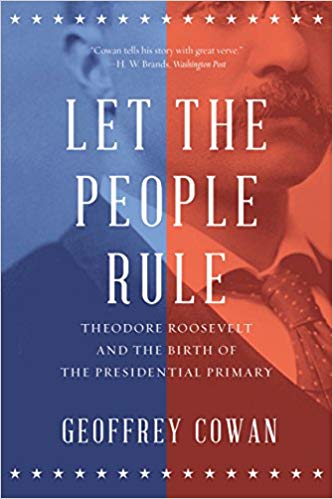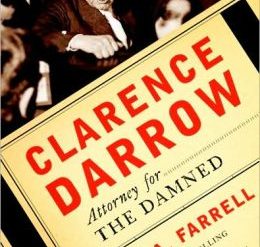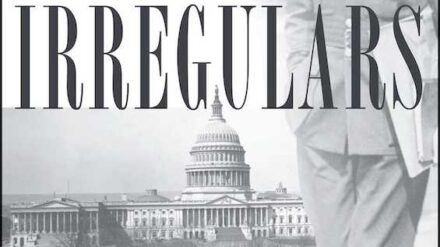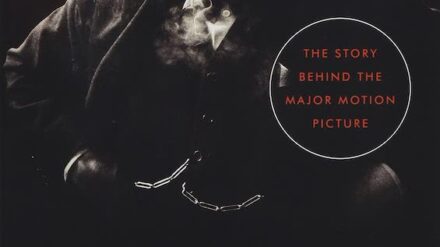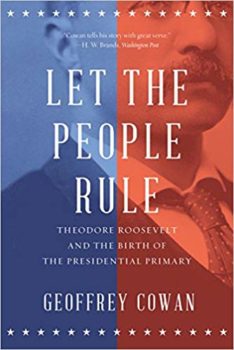
If Americans today know anything at all about Theodore Roosevelt, they’re likely to think of him as the man who led a charge of his Rough Riders up San Juan Hill in the Spanish-American War, was a big game hunter, established the United States Forest Service, took on the powerful railroad and Standard Oil trusts, and ran unsuccessfully for a third term in 1912. Was Teddy Roosevelt progressive? The label is usually attached to his name.
Estimated reading time: 6 minutes
Most historians rank Roosevelt among the handful of best Presidents in our history, and his face has been immortalized on Mount Rushmore. But while he may indeed have been one of our most effective chief executives, there was a far darker side to the 26th President. Some of it comes to light in Geoffrey Cowan‘s engaging history of Roosevelt’s role in the three-way 1912 presidential election, Let the People Rule.
Let the People Rule: Theodore Roosevelt and the Birth of the Presidential Primary by Geoffrey Cowan (2015) 353 pages ★★★★☆
Teddy Roosevelt was more complicated than popular histories suggest
The popular conception of Teddy Roosevelt is lacking in four different ways:
He was a racist.
Most biographies and other historical accounts of his years as President emphasize that, early in his first term, Roosevelt hosted Booker T. Washington in the White House. Roosevelt’s apologists point to that event and to his later relationships with other prominent African-Americans as evidence that he was a champion of racial equality. But nothing can be further from the truth. Roosevelt famously believed that only five percent of Black Americans deserved human rights. He had nothing but contempt for the other 95 percent, as Cowan’s account makes clear. (“‘I believe that the great majority of the negroes in the South are wholly unfit for the suffrage,”‘ Roosevelt said.) And his views of Japanese, Chinese, Koreans, and Filipinos were vitriolic. (Read James Bradley’s superb book, The Imperial Cruise, for an account of his views on Asia.)
By the way, Roosevelt never supported women’s suffrage, either, until the demands of the 1912 election campaign made it necessary for him to change his tune.
He busted few trusts.
Teddy Roosevelt, who was known as progressive during his first term in the White House, did enforce the Sherman Anti-Trust Act, bringing a total of 44 anti-trust suits and broke up the country’s largest railroad monopoly and regulated Standard Oil. But he was a believer in big business. He was convinced only “bad trusts” needed to be regulated, much less broken up. And when he ran for a third term in 1912, his opponents claimed he had knuckled under to pressure from J. P. Morgan while in the White House—and Cowan makes clear that was exactly what happened.
Was Roosevelt progressive? He was a tough, even nasty, and very practical politician.
The men who managed Roosevelt’s campaign for the Republican nomination were unprincipled in the extreme. They freely used bribery and threats of physical violence in their attempts to persuade delegates supporting William Howard Taft to change sides. Cowan suggests Roosevelt may not have been aware of what they were doing, but that’s hard to believe. In any case, it’s a matter of record that Roosevelt himself engineered the “draft” that allegedly persuaded him to throw his hat in the ring. And Cowan’s account of how Roosevelt came to settle on the policy that confirmed him as a racist is a study in dirty politics.
The former President (now known as “the Colonel” for his rank in the Spanish-American War) calculated that he could hope to beat his two opponents in the election only if he could pick up at least some electoral votes in the South. But the Democratic Party was solidly in control of the region. The Republican Party had never won elections there after Reconstruction. So, the only way he might hope to win any Southern state was to run a lily-white campaign, denying access to the many African-Americans who had previously supported him and hoping that Democrats would cross over to vote for him. (It didn’t work. Roosevelt received not a single Electoral College vote in the South, which Woodrow Wilson swept.)
He was largely responsible for today’s system of primary elections.
Cowan’s Let the People Rule is above all a study of how primary elections in presidential politics came to be a major feature of our political system. Although Roosevelt had long resisted the idea as proposed by the progressive reformers of the era, he came to champion the concept late in the run-up to the 1912 election because it was clearly the only way he could hope to take on his successor, William Howard Taft, who was running for reelection.
Taft had gotten the jump on Roosevelt by several months and he possessed all the advantages of incumbency. As a result, he had locked up a huge proportion of the available delegates through his relationships with the political bosses of the day. Roosevelt’s only option was to “Let the people rule.” As Cowan notes, “his campaign, more than any other force, popularized presidential primaries and increased the number of states that embraced them.” However, Roosevelt’s support for the idea of direct democracy was strictly qualified. As Cowan notes, “Every real proponent of democracy, Roosevelt said, ‘acts and always must act on the perfectly sound (although unacknowledged, and often hotly contested) belief that only certain people are fit for democracy.'”
In the end, Teddy Roosevelt was still a progressive
For years, despite a reputation as progressive, Teddy Roosevelt stoutly resisted proposals advanced by the most outspoken progressive activists of the time. Sometimes years passed before he acquiesced to their ideas. Yet in the end his efforts undoubtedly advanced the progressive agenda. “The Bull Moose campaign gave greater credibility to innovative ideas such as an eight-hour workday,” Cowan notes, as well as “a form of social security, a federal income tax, and a federal inheritance tax. Some of his ideas found their way into New Deal legislation championed by his [fifth] cousin, President Franklin Roosevelt . . .” In the end, then, Teddy Roosevelt was a complicated man, and despite his many faults clearly deserves recognition as a consequential figure in American history.
For related reading
Awhile back I reviewed another book that dealt with Theodore Roosevelt’s blatant racism: The Imperial Cruise: A Secret History of Empire and War by James Bradley (Teddy Roosevelt and the dark side of American foreign policy).
You might also be interested in:
- Top 20 popular books for understanding American history
- 20 top nonfiction books about history
- Great biographies I’ve reviewed: my 10 favorites
- Top 10 nonfiction books about politics
And you can always find my most popular reviews, and the most recent ones, on the Home Page.

